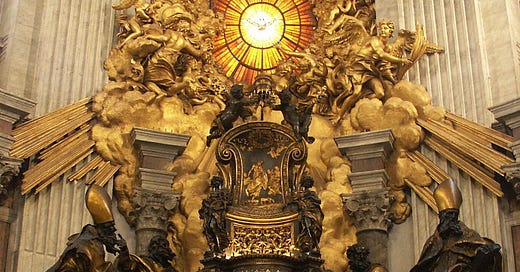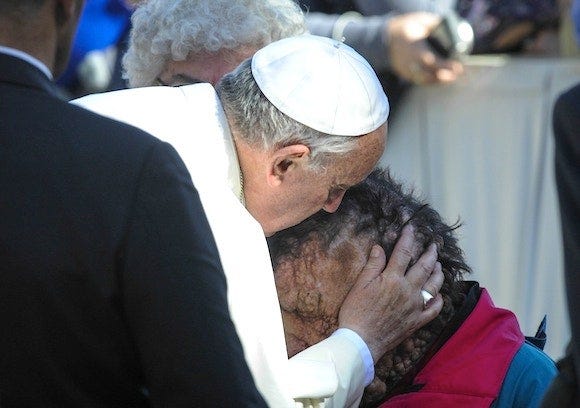I cannot fix the world, nor can you.
I cannot fix the church. Or my town. Or my family. I can barely fix myself.
In the aftermath of the pope's death, I read much from people who had anointed themselves either his defenders or his critics. They were here to save the Church! His critics saw nothing but a devil (in some cases, that's literally what they called him), while his defenders would hear nothing negative at all.
Detractors telling people they were fools and dupes to be inspired to a deeper faith in Christ by the successor of the Apostle Peter is quite a take. As for the defenders, the people of God will no longer overlook the myriad failures of the institutional Church and many of her leaders, even when that includes Peter himself. Twenty-three years after Spotlight, that's not an option.
It was a papacy with very real and serious problems, especially the ongoing failure to deal with sexual abuse, and the crushing of vibrant traditional faith communities. It also offered many beautiful gifts, particularly from a pope who preached gospel values in a way that resonated with many.
Honestly, if you can't see how this man would move and inspire people, I don't know what to say:
In the end Francis was, simply, a man, faithful and flawed and placed in the impossible position of succeeding two of the greatest intellects the church has ever produced. Catholics don’t believe the pope is flawless. We believe he’s preserved from error when defining ex cathedra a matter of faith and morals, not that he’s immune from criticism in charity. It’s just that too many people forget the ”charity” part.
"The Vatican" is Not The Church
It’s pointless to obsess about the inner workings of the Vatican. The Vatican is a beautiful-horrible mess and always has been. Sometimes, the worst people in the Church wind up there, failing ever-upward, but also some of the best, who try mightily to steer this unsinkable barque through one tempest after another. As the cardinals enter the conclave and choose a new pope, some of the personalities and politicking often hidden from site will be consuming the news for weeks.
Intermittently, throughout its history, the Vatican has been both a corrupt den of depravity, and the protector and sustainer of this beautiful, holy, enduring thing called Catholicism. Anyone who thinks this epoch or this papacy was uniquely bad or even "the worst ever" (lol, if only) needs to get a grip. We've been through worse. We'll be through worse. Yet here we are.
So the Church is a mess. Not exactly a news flash. So (probably) are you. So (definitely) am I. What should we do about it? What can we do about it?
For starters, stop worrying about it. Stop, if you can, even thinking about it. If you speak about Church decisions and politics, speak in charity. The Vatican is what it is and always has been. It is not “The Church”: it is the sustaining bureaucracy of the Church and the seat of Christ’s vicar. The decisions made there and the things that happen there are consequential, but often remote from our lives. And remember the basic rule of conclaves: no one knows anything.
Ever Ancient, Ever New
Catholics for centuries would go their entire lifetimes without hearing a word about or from the Vatican. The beating heart of our faith life is, and always has been, the parish. That’s where each of us has to live it out, struggling each day to become a little more like Christ and a little less like the people who killed him.
The task of the Church and its hierarchy is to preserve and hand on the faith of the apostles. That doesn't mean nothing ever changes. People hiding in catacombs of the Roman Empire have different needs from farmers surviving plague in the middle ages and from the laptop class in a secular and pluralistic culture today.
The truths of the faith never change, but the shapes they take will change of necessity, because humans change. I'm a more devoted antiquarian than most, and at this moment I'm writing on a laptop, streaming Haydn through Spotify, and drinking coffee brewed with a machine. I love the eternal truth and beauty of the ancient church, but I’m not about to start LARPing the Middle Ages.
"God is three and yet one" and "fornication is a grave sin" and "welcome the alien for you were once aliens in Egypt" are all as true now as they are eternally, but the way we understand and live out those truths is always experienced anew by each generation.
And all of that truth is plugged into the vital sources of life-sustaining power: revelation and the Eucharist. The Church gives us Scripture and Tradition, defending God's revelation even when the zeitgeist is against it. The priests and bishops in union with the pope enable the eucharistic body of Christ to sustain the faithful down through the ages from the moment of the Ascension to the sound of the seventh trumpet. That Eucharist, in turn, builds us up and unites us into one body. The Church makes the eucharist, and the eucharist makes the Church.
Binding all of it together–upholding it, embracing it, surrounding it, penetrating it–is God. He’s there whether we perceive him or not. He’s got this. Reading Psalm 77 at Lauds this morning, I was struck in a particular way by the mixture of lament at God’s silence and confidence in his presence. The psalmist is in despair for the world he has lost:
I consider the days of old,
the years long ago.
”Let me remember my song in the night;
let me meditate in my heart.”
Then my spirit made a diligent search:
“Will the Lord spurn forever,
and never again be favorable?
Has his steadfast love forever ceased?
Are his promises at an end for all time?
Has God forgotten to be gracious?
has he in anger shut up his compassion?”
The response is memory and faith: a recollection of the wonders God has already wrought when He made his power known to the Jews and redeemed the children of Jacob and Joseph, and assurance that He continues to do it.
And even when they could not see Him, they knew He walked with them, although “no one saw his footprints.”
But it is the last line that should give us hope:
You led your people like a flock
by the hand of Moses and Aaron.
It feels like an abrupt ending to the Psalm, and that should tell us that this is important. Moses and Aaron: His prophet and His priest. The Church preserves those prophetic and priestly duties. God chose these men, and yet they were deeply flawed. Moses could be weak, he was a murderer, he was often afraid, he disobeyed. Aaron was easily swayed and a straight-up idolator.
So what? Peter ran, Thomas doubted, John and James wanted honor and glory, Judas betrayed. Human history is not pretty. It can be dark and complex. Individuals fail. Even institutions can fail in their duties. But the Church, the body of Christ united under the successor of Peter, can never fail. It can never fail because God leads his people like a flock, even when we can’t see his footprints.
Notes
The ESV
I've been gravitating towards the ESV-CE lately because of its greater precision. I'm not 100% happy with any translation, but this seems to balance the best current scholarship with readability and dignified language. As far as I understand, about 92% of it overlaps with the RSV, so it will be familiar to many. Even the Catholic version has some Evangelical nonsense, such as using "overseer" instead of "bishop" for episkopus, although almah is rendered as "virgin" rather than "young woman."
It's Ez 20:25-26, however, that usually draws my attention. Most translations use the phrase: "I defiled them through their very gifts in making them offer by fire all their first-born"
That is not what the original languages say. This (from the ESV) is what it says.
defiled them through their very gifts in their offering up all their firstborn,
"By fire" is not in the underlying Greek or Hebrew. It changes the entire meaning of the text from God demanding child sacrifice by fire to God demanding the dedication of the first born. While habir, to offer or set apart, is frequently used for a burnt offering, in Exodus it suggests a simple dedication, and in Leviticus it’s strictly prohibited to offer children by fire. Ahaz and Manasseh are both accused of child sacrifice, but it's condemned.
Ezekiel may be looking back at this time to explain why David kings fell into abomination, but he's not saying God actively led them to kill their children. "By fire" should not be in this line. I have no idea why the RSV retains it. Naturally, the NAB gets it wrong.
Speaking of the NAB…
Standing at the ambo proclaiming the NAB translation of these words of the Good Thief from Luke 23:41 always makes me annoyed:
For the sentence we received corresponds to our crimes, but this man has done nothing criminal.”
The sentence corresponds to our crimes? That's a terrible translation. ESV/RSV goes with:
For we are receiving the due reward of our deeds; but this man has done nothing wrong.”
Dark Winds
I watched Dark Winds Season 2, an adaptation of Tony Hillerman's People of Darkness, from his Joe Leaphorn / Jim Chee mystery novels about the Navajo Tribal Police. It's a good series with a strong sense of place, and was just the right length at 6 episodes. Zahn McClarnon is perfect as Leaphorn, although I'm less convinced by Kiowa Gordon as Chee. It makes me want to pick up the books again. They often had a mythical quality, and the series does a good job capturing that.







Thanks Tom, beautiful and timely.
Social media is also the best and the worst - here I am, able to read your writing, (and some others worthy of reading), and yet at the same time what a complete mess of misinformation and ugliness.